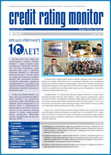Credit-Rating Sums Up Economic Figures For July and August 2010
Credit-Rating has today published a monthly survey of Ukraine’s economic development in July and August 2010. The survey features evaluation of real and financial sectors of economy, of balance of payments, of currency and stock markets, state budget sector and government’s debt-related policy.
The agency notes that according to figures recorded for 7 months, there has been deceleration of recovery rates in a number of sectors (according to the National Bank of Ukraine the production rate of fundamental sectors was recorded at 1.4% in July, and at 5.8% in June, year-on-year). The biggest negative impact on the pace of economic activities was made by agricultural sector due to declined figures of output in its crop sector because of adverse weather conditions, and tumbled output rates in metallurgy sector prompted by seasonal subsidence in activities, and weak demand in foreign markets. The reviving business activities in the previous months have resulted in slight increase in volumes of construction works during this year, and affected consumer sentiments, which resulted in slight increase of retail sales.
The development outlook of the construction sector and retail sector for the rest of 2010 remains rather modest. There retains the inertial impact of factors of poor financing, and the situation in economy will be contingent on both the recovery rates and prospects for resumption of lending by banking institutions. Besides, the consumption will be weighed by increased expenses for utility payments because of rising tariffs. The anticipated rise in business activities in September sets preconditions for gradual rise in metal prices – however, fast recovery in demand is unlikely. Generally, we assume growth of production in the national metallurgy sector in short-term perspective (preliminary data shows a rise in steel production recorded in August). However, the rates of recovery will be weighed by anticipated deceleration in development rates of developed economies, deceleration in China economy growth and slow recovery of demand in the Middle East.
The environment in the global commodities market prompted cuts in export volumes by 2.3% versus previous month. Even though, in July 2010 the trend of positive consolidated balance of payments of USD0.7bn retained. However, unlike in previous periods, in July the positive balance was formed due to inflow of foreign currency by financial and capital accounts, with the balance of current account being negative. The retaining inflow of foreign currency, primarily due to raising funds from foreign capital markets, and tranche of IMF in the amount of USD1.89bn allowed the National Bank to augment volume of international reserves and to strengthen national currency versus USD. Further nature of exchange rates will be mainly contingent upon general and economic environment in the country and in foreign markets, as well as on confidence in the national currency from Ukrainian and foreign investors.
In the sector of public finances Credit-Rating notes rise in receipts to the state budget. According to the State Treasury of Ukraine, in January-July the incomes increased by 17.6% versus similar year-earlier period. Having resumed cooperation with the IMF, Ukraine undertook rather strict obligations on reforming national economy and adjustments in the national economy-related policy. The government has cut incomes and expenditures of the state budget by 5% and 5.3% respectively, which resulted in shrinking budget deficit. At the same time, the government continues active debt policy in the domestic market by issuing internal bonds, which allows for maintaining adequate level of budget liquidity, and for partial repayment of previously issued debt securities. In August 2010 the Ministry of Finance of Ukraine has issued 4 taps of so-called ‘VAT bonds’ for the overall amount of over UAH16bn. The demand for the VAT bonds was in a great excess of offered volumes, which contributed to hot competition in the market and prevents from recovery in the sector of corporate bonds until the demand for VAT bonds is satisfied.
In the financial sector the rise in the money aggregate continued in July due to progressing money emission and rising resources of banks. In order to secure stability of money and credit market, the National Bank took rather active measures aimed at fighting excessive liquidity by offering primarily short deposit certificates, and providing hardly any refinancing, and by performing two-side quotes for purchasing state internal bonds. The retaining growth of resources prompted certain improvement of banks’ lending activities. Further we anticipate in short-term perspective a retention of such trends in the banking sector.
Credit-Rating agency has operated in the Ukrainian market since 2001 being committed to assignment of the national scale ratings. The agency has assigned 1099 ratings. In July and August 2010 Credit-Rating assigned 12 ratings, revised 102 ratings, suspended 32 ratings and withdrew 13 ratings. As of September 1, 2010 Credit-Rating maintains monitoring of 629 ratings, in fact 476 of corporate, 98 of financial and 55 of municipal sectors.
Information on all credit ratings assigned in accordance with the National Rating Scale may be found in REUTERS and BLOOMBERG information systems.
For more information, please contact:
Information and
analytic department
Sergey Rozumyak +38044490 25 50
SRozumyak@credit-rating.com.ua
Denis
Rudenko
DRudenko@credit-rating.ua





